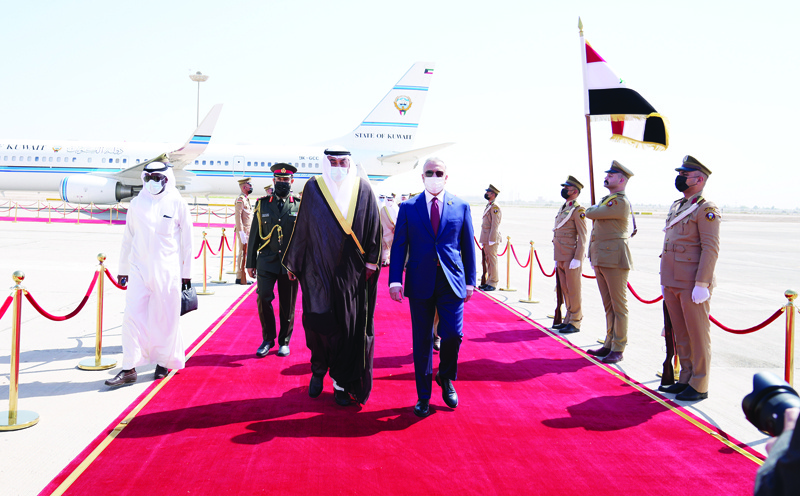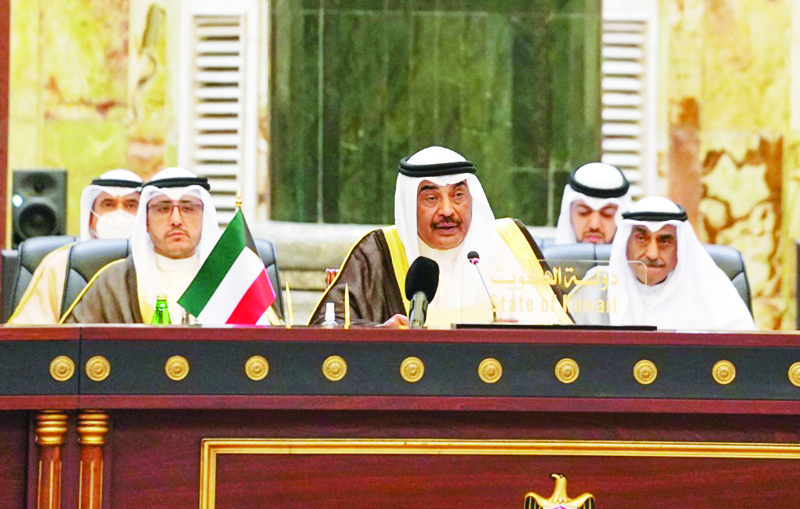 BAGHDAD: His Highness the Prime Minister Sheikh Sabah Al-Khaled Al-Hamad Al-Sabah is being received by Iraqi Prime Minister Mustafa Al-Kadhemi on his arrival at Baghdad International Airport yesterday. KUNA photos
BAGHDAD: His Highness the Prime Minister Sheikh Sabah Al-Khaled Al-Hamad Al-Sabah is being received by Iraqi Prime Minister Mustafa Al-Kadhemi on his arrival at Baghdad International Airport yesterday. KUNA photosBAGHDAD: His Highness the Prime Minister Sheikh Sabah Al-Khaled Al-Hamad Al-Sabah, addressing the Baghdad Conference for Partnership and Cooperation in the Iraqi capital yesterday, noted that the convention is held at critical and crucial time in the region. Sheikh Sabah Al-Khaled emphasized that the region could never witness stability as long as Iraq remained unstable.
"Iraq is one of the basic security and economic foundations in the region," he said, lauding the nation's success in overcoming and tackling majority of the problems it had encountered since years back. Iraq will experience a pivotal phase in its political process that is the parliamentary elections due on October 10 (2021), Sheikh Sabah Al-Khaled stated, noting that the nation would need support from the regional states and the international community to back up the scheduled polling process.
 BAGHDAD: His Highness the Prime Minister Sheikh Sabah Al-Khaled Al-Hamad Al-Sabah addressing the Baghdad Conference for Partnership and Cooperation in the Iraqi capital yesterday. ¨CKUNA
BAGHDAD: His Highness the Prime Minister Sheikh Sabah Al-Khaled Al-Hamad Al-Sabah addressing the Baghdad Conference for Partnership and Cooperation in the Iraqi capital yesterday. ¨CKUNAThe Kuwaiti Prime Minister noted further that the support for Iraq would entail bolstering its sovereignty, independence, territorial integrity, non-intervention in its domestic affairs and meeting aspirations of the Iraqi people. The State of Kuwait is among the forward states in the region that sense and interact with the difficult security and economic conditions in Iraq, "thus we will not be reluctant in supporting it in the hardest times," he stressed.
The Taleban's takeover of Afghanistan overshadowed the summit in Iraq yesterday attended by key regional leaders, with French President Emmanuel Macron warning of the threat Islamic State group jihadists pose. The meeting comes as Iraq, long a casualty of jihadist militancy, also tries to establish itself as a mediator between Arab countries and Iran. "We all know that we must not lower our guard, because Daesh (IS) remains a threat, and I know that the fight against these terrorist groups is a priority of your government," Macron said, after a meeting with Iraqi Prime Minister Mustafa Al-Kadhemi.
Iraq and France "are key partners in the war against terrorism," Kadhemi replied. Egyptian President Abdel Fattah Al-Sisi and Jordan's King Abdullah II flew in for the summit, while the foreign ministers of Iran and Saudi Arabia were also present. In addition to Sheikh Sabah Khaled Al-Hamad Al-Sabah, Qatar's Amir Sheikh Tamim bin Hamad Al-Thani, Dubai's ruler, Sheikh Mohammed bin Rashid Al-Maktoum and Turkey's foreign minister were also present.
'More urgent than ever'
Iraq is seeking to play a "unifying role" to tackle crises shaking the region, sources close to Iraq's Kadhemi said. Oil-rich Iraq has been caught for years in a delicate balancing act between its two main allies, Iran and the United States. Iran exerts major clout in Iraq through allied armed groups within the Hashed Al-Shaabi, a powerful state-sponsored paramilitary network.
Baghdad has been brokering talks since April between US ally Riyadh and Tehran on mending ties severed in 2016. "It was really not easy to put the Saudis and Iranians in the same room," a French diplomatic source said. But an adviser to Kadhemi said that just the presence of the two foreign ministers together was itself a "success". Macron aims to highlight France's role in the region and its determination to press the fight against terrorism, his office said. The French president considers Iraq "essential" to stability in the troubled Middle East, it added.
The Baghdad conference "will make it possible to lay the framework for cooperation in the fight against terrorism," Macron said. An IS affiliate claimed Thursday's suicide bombing in Kabul that killed scores of people, including 13 US service members. The attack has revived global concerns that the extremist organization, which seized swathes of Syria and Iraq before being routed from both countries, is emerging anew, analysts said.
In July, President Joe Biden said US combat operations in Iraq would end this year, but that US soldiers would continue to train, advise and support the country's military in the fight against IS. Washington currently has 2,500 troops deployed to Iraq. Rasha Al Aqeedi, senior analyst at Newlines Institute for Strategy and Policy, said coalition forces believed Iraq's security personnel could prevent another IS advance. "Maybe they're not ideal, but they're good enough for America to leave the country believing that Iraq is not going to live through another 2014," she said. - Agencies









